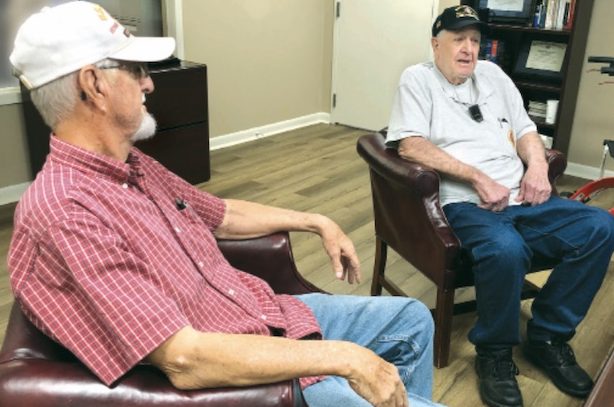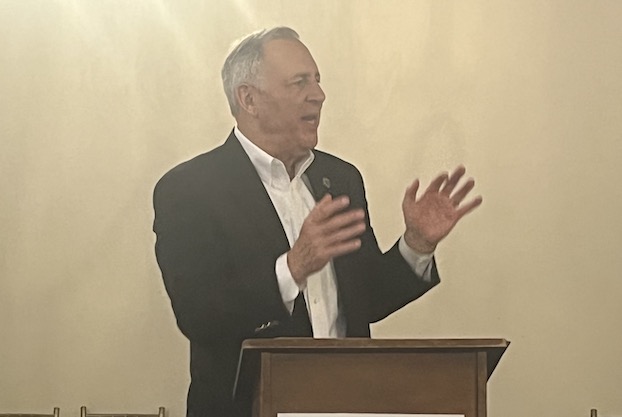One Soldier’s Post-War Journey: It took 53 years for Vietnam veteran Carroll Landry’s wartime disability claim to be approved
Published 9:17 am Saturday, March 25, 2023

- Lance Cpl. E-3 Carroll Landry, left, is grateful for the assistance fellow veteran and former Army Corp. of Engineers Capt. Al Cochran, right, provided in pushing forward with his disability claim. (Donna Price / American Press)
Lance Cpl. E-3 Carroll Landry is a near-spitting image of his father; he inherited his charismatic smile, bronze skin and brown hair.
But Cpl. Irving Landry’s influence on his son extends beyond being a Marine alone; Carroll also inherited his father’s desire to serve his country during a time of war.
Following in the footsteps of his father, he volunteered for the Marine Corp when he was 18 and went to San Diego for boot camp. Also like his father, he was stationed at Camp Pendleton in Oceanside, Calif., before volunteering to go to Vietnam in 1967.
Trending
“My dad was a Marine, and he served on Iwo Jima and survived,” Landry said. “He came back and was home for 13 years before he died.”
Landry said his father was a construction worker for a new industrial plant being built by the then-Cities Service industrial complex when an air compressor exploded at the work site, killing him instantly.
“I was 10 years old then and I knew I wanted to grow up and be just like him,” Landry said. “I kind of fell in the footsteps of my dad; he went to San Diego for boot camp, he went to Camp Pendleton. Then he volunteered to go to a war zone and he made it back and then I went to one and made it back.”
Landry said he’d do it again, too — despite the pain he endured one fateful day along the Cua Viet River.
“During that time we were doing tether fencing so we were under artillery and rocket fire for a lot of the time,” he said. “Towards the end of my tour, I was seven miles south from the DMZ (Vietnamese Demilitarized Zone) with a Navy and Marine unit and we had 660,000 gallons of aviation fuel, regular gasoline and diesel and we got hit pretty often. We couldn’t go to work because they had our number.”
He said his team was eventually moved further up river to “get out of harm’s way every day, I guess.”
Trending
“We were just doing the duty we were assigned up along the Cua Viet River, pumping water from the river into an 18-wheeler tanker truck for the Marine’s shower water when we had a freak accident,” he recalled. “They turned the pump on and I was on top of the truck and the water was moving from a four-inch hose to a two-inch hose and it started just whipping, coming at me. I didn’t know whether to let it go or hold on. I tried to hold on and it picked me straight up and then straight down on my head.”
He said he was knocked unconscious and medically evacuated to a Navy hospital in Da Nang, where he stayed five days.
“Then I went back to my unit, but I didn’t stay very long because my time was up,” he said. “They moved me back to California and I got out because my two-year sign-up was done.”
Landry said when he filed his first disability claim in 1970, he was told there was no record of his hospital stay in Da Nang.
“They denied the claim, so I filed again and it would be denied again,” he said. “This went on for years and so I finally gave up and thought, ‘This just ain’t going to happen.’ They told me the files were burned in a fire in Missouri. I knew what happened to me, but I couldn’t prove it.”
He said he got into the Veterans Affairs hospital system in 2013 and was diagnosed with neuropathology, a condition that affects the nerves outside the brain or spinal cord, and diabetes, due to his exposure to Agent Orange.
That’s when he met former Army Corp. of Engineers Capt. Al Cochran with the Disabled American Veterans.
Cochran — who served in Vietnam at the same time Landry was there — was a volunteer chapter service officer, helping veterans with their disability claims.
“He came in, sat down at my desk and he told me his story,” Cochran said. “I told them those records exist, I know they exist. ‘I have no idea where they are, but you were not what we call a ‘patch-and-go’ where they put a Band-Aid on you and send you on your way. They treated you in a Navy hospital, sewed you up, X-rayed you. Those records exist, they’ve just got to be found.”
Cochran said he contacted the veterans constituent representative with then-U.S. Congressman Charles Boustany’s office and told her he needed her help to search for the missing records.
“In three weeks, she called and said, ‘I’ve got 18 pages in my hand and it’s exactly what you said in your claim.’ ”
By that point, Landry had already been denied disability five times.
But he didn’t give up.
Cochran, a disabled veteran himself who has been treated for post-traumatic stress disorder, said he felt called to help other veterans find their way through the claims process.
“He had a claim himself and told me the VA wasn’t really processing the claim fast enough for him so he got all the books that you need to be a DAV service officer and educated himself,” Landry said. “Then he started helping others, and I’m one of them.”
Cochran, now 81, said he’s fully retired from claim work but never gave up hope he would see Landry receive his full disability claim during his lifetime.
Landry said the pair filed a sixth claim with the new-found records — and this time received a partial payment award for the years 2010-2019.
“They gave him an award for 40 percent for traumatic brain injury, but they wouldn’t give him the amount of time that he was entitled to by law,” Cochran said.
Landry said his wife also continually encouraged him to keep trying for the full amount.
“She said, ‘Don’t give up. That’s what they want you to do.’ So we just kept pushing forward, filing more claims, then on Aug. 13, 2021, she passed away and she never got to see the end result of it.”
The end result? Landry was awarded full disability on Sept. 12, 2022 — 53 years after filing his first claim.
“It was a law judge from Washington, D.C., and me and Al and a representative of the DAV in New Orleans, Donald Bryant,” he said. “The judge listened to our case on a teleconference and said, ‘I’ve never had a case that wasn’t settled for this long a period of time; 53 years is a long time. I can’t change the past, but I can help the future.’ ”
Landry said the judge issued the ruling within a week of that meeting.
Cochran said this is a story of hope for other discouraged veterans fighting to see their claims approved.
“I knew what the law was and I wasn’t budging — and neither was he,” Cochran said with a chuckle.
Landry received a lump sum payment going back retroactively to 1970 and will continue to receive his monthly payment for full disability.
“It was a long process but I would encourage other veterans to never give up,” he said. “Exhaust all means that you can do. I never thought I’d get to see it and I was worried about Al never getting to see it, too, but it happened.”
Landry, now 75, said the effects of Agent Orange have led to pancreatitis and diabetes. He also has burning sensations in his finger tips and lower legs and a spinal chord stimulator in his back from the neck injury sustained during the hose accident.
“I do feel a little more relaxed now, not having that burden on my shoulders of will I or won’t I ever receive my claim,” Landry said. “I feel I can finally breathe.”
Plus, he gained friend for life in Cochran.
“A friendship blossomed out of this, for sure,” Cochran said.





